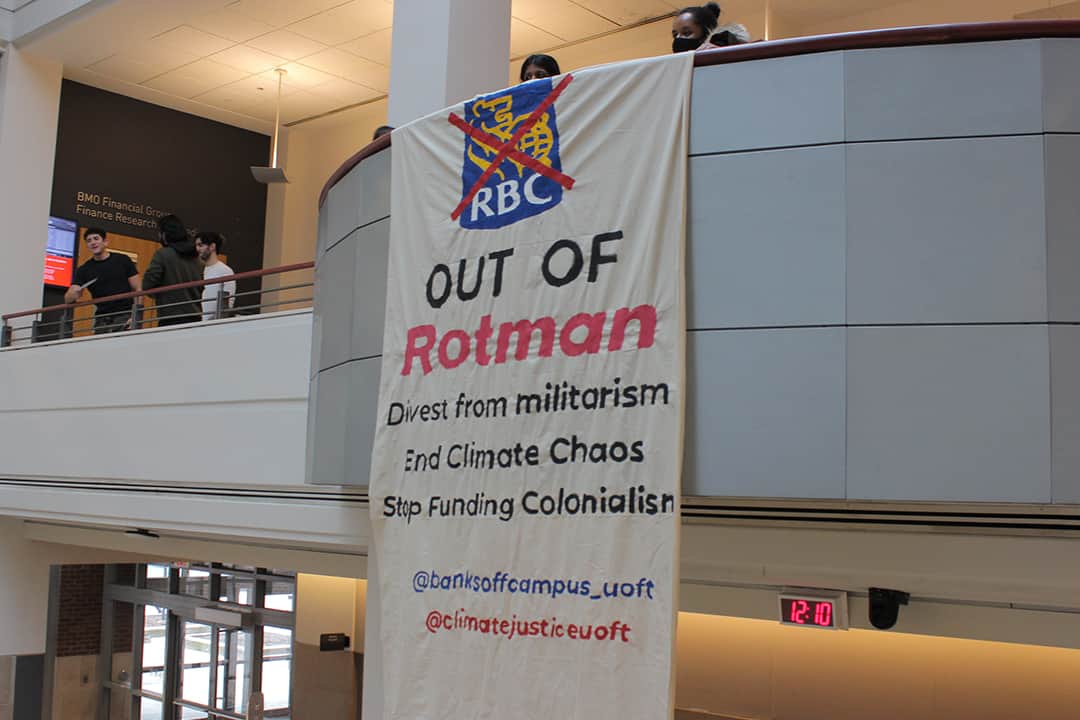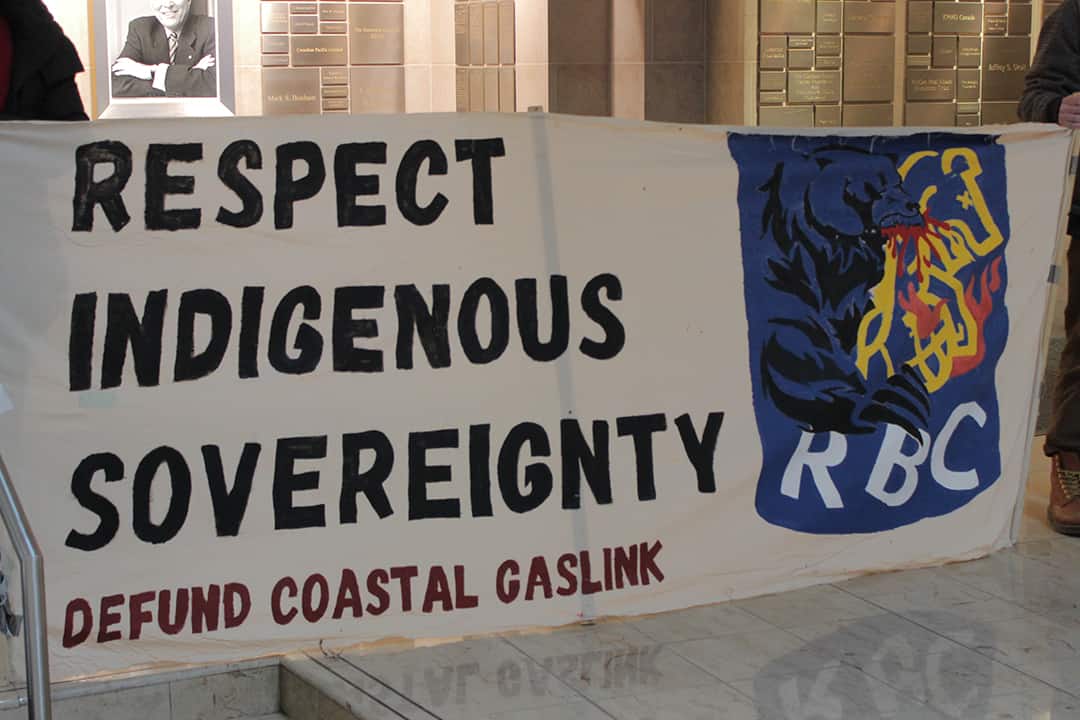Climate Justice UofT (CJ UofT) has had a busy month — following a banner drop at Rotman on February 5 that was part of the new phase of its Banks Off Campus campaign, the group launched its “Bound to Big Oil” report, which emphasized U of T’s many connections with the fossil fuel industry, on February 8.
Although U of T and its federated colleges have committed to divestment from fossil fuels, fossil fuel presence continues to pervade the University, according to research done by CJ UofT. In particular, as part of this campaign, the organization has highlighted the university’s connections with the Royal Bank of Canada (RBC), which it notes was the largest financier of fossil fuel projects globally in 2022.
In a statement to The Varsity, Anaum Sajanlal, a second-year student majoring in history and critical studies in equity and solidarity and the CJ UofT’s spokesperson for the Banks Off Campus campaign, also scrutinized the impact of fossil fuel-affiliated corporations on First Nations such as the Wet’suwet’en nation.
Taking banks off Rotman
CJ UofT has a history of advocating against the presence of financial institutions on campus. In March 2023, the organization hosted a sit-in at the University of Toronto Students’ Union (UTSU) Student Commons’ RBC branch to call for the Union to cut ties with the bank for its financial ties to the fossil fuel industry. This action was successful — the UTSU agreed to not renew its lease for the RBC branch after it ends in 2026 and also committed to declining all sponsorships from the bank.
CJ UofT calls for specific financial institutions to end their presence at U of T through the Banks Off Campus campaign. According to a guide to the movement released by the student group, the initiative “aims to pressure the university to sever all ties with the ‘Big Bad Five’ banks — RBC, Scotiabank, Bank of Montreal, Canadian Imperial Bank of Commerce, Toronto Dominion (TD) — on campus so long as they continue to fund colonial violence in so-called Canada and abroad.”
Currently, the climate action group is targeting the Rotman School of Management, U of T’s business school that offers undergraduate and graduate programs, and their connections with RBC. “Rotman is tied to RBC in many ways, some of which we’re hoping to bring to light over the course of the campaign,” wrote Sajanlal.
On February 5, protesters dropped a banner in The Joseph L. Rotman School of Management stating that RBC should be “out of Rotman” due to its connections with militarism, climate chaos, and colonialism.
When asked what prompted the most recent action at Rotman, Sajanlal wrote that “we have lots of evidence for why RBC is a deeply unethical corporation,” citing the bank’s current financing of the controversial Coastal Gaslink Pipeline in British Columbia — a project that has come under fire for violations of local Wet’suwet’en sovereignty and heavy-handed police action against protestors and land defenders.
The Rotman Commerce program has significant ties with RBC. The program has hosted case competitions and recruitment events, like the RBC x Rotman Sustainable Finance Week. “The bank has very successfully portrayed itself as a climate-friendly, youth-friendly institution, but these are all lies,” wrote Sajanlal. They said the group carried out the banner drop to “[expose] [RBC’s] role as funders and enablers of colonial violence and the destruction of our futures.”
CJ UofT’s campaign against banks isn’t just grounded in removing RBC from campus — it’s also about winning the hearts of Rotman students. “Sometimes when we disrupt events, we get booed by students and laughed at. With Rotman, we’ve found that so far this has been the vast majority of students’ response,” wrote Sajanlal.
Despite these initial setbacks, they were optimistic about their prospects in educating Rotman students about their mission: “We spoke to many students and one of them said that they were planning to work for RBC, but after learning about how unethical they are, they’re considering looking elsewhere for employment.”
In a statement to The Varsity, a spokesperson from RBC wrote, “We recognize the imperative for climate action and embrace our role as a bank that will support our clients and communities to accelerate the transition to a greener economy. Supporting our clients on their decarbonization journey is where we believe we can have the biggest impact in the climate transition.”
“We respect the inherent right of Indigenous peoples to self-determination in accordance with international and domestic law,” they wrote.
The “Bound to Big Oil” Report
While the Banks Off Campus campaign currently has a strong focus on the relationship between Rotman and RBC, CJ UofT’s “Bound to Big Oil” report revealed how the university at large remains intertwined with the fossil fuel industry through millions in donations, research funding, and the professional affiliations of several members of university governing bodies.
On February 8, CJ UofT hosted the reveal event for its report. The report authors manually culled through the list of donors to U of T’s Boundless campaign and added up the donation amounts from all donors deemed to be part of the fossil fuel industry, funding the industry, or promoting industry talking points, based on the Corporate Mapping Project’s definition.
Working with the bottom ranges of the donation amounts listed on the Boundless website, the authors determined that the University received at least $64 million in direct monetary contributions from fossil fuel-affiliated corporations between 2008 and 2018. Additionally, the authors noted in the report that they weren’t able to find any central database that tracks the exact amount of financial contributions to the University, and so their findings represent a lower-end estimate.
Using the “funding agency” search parameter on the Web of Science database — a database that compiles information on published scientific papers — the report authors found that 635 published research articles affiliated with U of T between 2018 and 2023 mentioned fossil fuel companies in their funding disclosure. “About 25 percent of the articles were affiliated with climate science,” said Erin Mackey, one of CJ U of T’s co-founders and primary authors of the report, in an interview with The Varsity.
The Banks Off Campus report also highlighted fossil fuel executives’ continued presence on the University of Toronto’s Governing Council, the central body responsible for the “government, management and control of the University [of Toronto]” according to the 1971 University of Toronto Act. According to the report, one TD executive and one RBC executive currently sit as a part of the University’s Governing Council, and executives of corporations such as Imperial Oil have previously held seats on the Council.
In response to these findings, a U of T spokesperson wrote in a statement to The Varsity that U of T’s research funding decisions are governed by its research ethics policy, publications policy, policy on research partnerships, and conflict of interest policies. These policies address and illustrate the general rules that govern the University’s actions, and are designed to protect research independence.
The spokesperson also pointed to the Provostial Guidelines on Donations by the Division of the Vice-President & Provost, last updated in 2021, which is more specifically focused on how the University interacts and handles donations. The Guidelines state, “The University values and will protect its integrity, autonomy, and academic freedom, and does not accept gifts when a condition of such acceptance would compromise these fundamental principles.” They specify that when researchers use funding gifts for a designated purpose, it still “must be consistent with the University’s mission and approved academic priorities.”
The spokesperson expressed, “[U of T is] deeply committed to both meeting the global challenges posed by climate change and maintaining the highest standard of integrity in research.”
“In pursuit of that work, faculty identify and secure funding that they determine is appropriate to their research, which may include funders that some in our community do not support. There is no policy at U of T – nor any federal law or directive – that prohibits scholars from taking funding from fossil fuel companies, however, one defines that term,” added the spokesperson. “We don’t limit or censor these opportunities as this is a fundamental tenet of the university’s commitment to academic freedom.”
CJ UofT’s recommendations
CJ UofT’s ultimate purpose with its campaigns is to remove any connection between the university and institutions promoting fossil fuel usage. As stated in its report, the organization’s calls for “full fossil fuel dissociation” are described as “cutting all financial, reputational, and other ties between the University of Toronto and the fossil fuel industry.”
The Banks Off Campus campaign wants to make sure that organizations like RBC will not have a future inflow of student hires through access to the University’s recruiting events: “The goal is to reduce their recruitment opportunities… and to disgrace them in the eyes of the public so they are not seen as prestigious or working in the interest of the people,” wrote Sajanlal.
When asked about what employment opportunities on campus would replace corporations like RBC, Amalie Wilkinson, one of the authors of the “Bound to Big Oil” report, responded that “if Canada is serious about transitioning away from fossil fuels, [fossil fuel extraction companies] no longer going to be the key economic actors… there are a ton of other companies, including civil society actors, government spaces, and other private actors that are much better aligned with principles of environmental justice [where students can find employment].”
Moreover, CJ UofT feels that professors and executives at Rotman must eliminate their ties to the bank. The report noted that several professorships and chair positions, among other positions at Rotman, are endowed by petroleum and oil companies. Sajanlal expresses on behalf of CJ UofT, “We see this as a conflict of interest. How can those tied to companies that enable the destruction of our future be allowed to hold positions of power and authority at a university?”
Editor’s note (April 29): An earlier version of this article misquoted Amelie Wilkinson as referring to “companies like RBC” instead of “fossil fuel extraction companies” becoming less significant economic actors. The article has been updated to clarify their statement, and to include comment from RBC.




No comments to display.